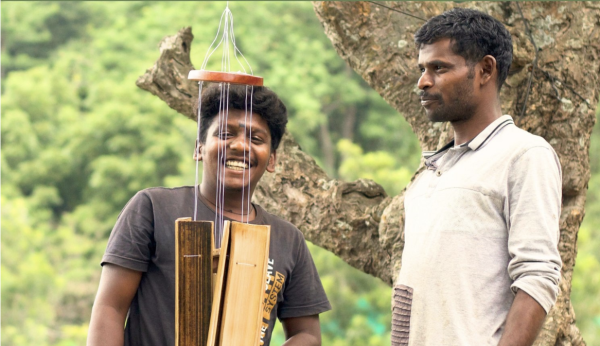Cleveland Film Festival Highlights Ukraine
The Cleveland International Film Festival’s theme this year was LOOK CLOSER, inviting audiences to “seek out connections to diverse cultures and perspectives,” according to the festival’s website.
The 47th iteration of the festival took place in Cleveland’s Playhouse Square from March 22 to April 1. It showcased 121 feature films and 199 short films that represented 67 countries and included a partnership with the Odesa International Film Festival, allowing for screenings of films that could not be shown in Odesa due to Russia’s invasion of Ukraine. The festival was followed by an online version, CIFF Streams, which occurred from April 2 to April 9.
Films were organized into several categories, which spotlighted films by or about members of marginalized groups, including Black, Latinx, Indigenous, Asian, disabled, queer, Jewish, and Ukrainian cinema. Related competitions included the Local Heroes Competition for films made about or by Ohioans, and the International Narrative Competition, designed to expose viewers to stories from around the world.
For many Cleveland residents, the festival’s inclusion of Ukrainian films in partnership with the Odesa International Film Festival upheld the CIFF’s commitment to showcasing films that tell a wide array of stories and give voices to those usually excluded from similar festivals. Cleveland has a large Ukrainian population that has only grown since the full-scale invasion, as refugees have settled in northern Ohio. Many of the Ukrainian film screenings had Ukrainian community members in the audience. However, the films stuck with non-Ukrainians as well.
“I don’t have words to describe what was shown in the film, but the important thing is that it was shown,” Zach Nelson of the Northeast Ohio organization Global Cleveland said of the documentary 20 Days in Mariupol.
At the end of the film, which is a narrated collection of one journalist’s footage of the siege of Mariupol, Nelson described how everyone left in silence, still processing what they had seen.
For the filmmakers, the festival’s choice to include many Ukrainian films and to uplift Ukrainian stories was a critical one.
“Each and every one of us became a soldier in our own field of expertise, and these are the soldiers on the cultural front,” filmmaker Polina Buchak, whose film premiered at the festival, said. “I’m so thankful that [the festival] highlighted Ukrainian stories and created a space for us to spread our message and to connect with an international audience to show what a Ukrainian is, what a Ukrainian sounds like from so many angles and perspectives.”
Two Ukrainian films won awards at CIFF. Pamfir, a film about a former smuggler and his family, won the George Gund III Memorial Central and Eastern European Competition. 20 Days in Mariupol won the Greg Gund Standing Up Competition, “a celebration of activism and the fight for social justice,” according to the festival’s website.
In Ukraine, film is a tool to spread the truest experience of Ukrainians in the midst of so much disinformation.
“We have this huge machine of Russian propaganda,” filmmaker Lesya Kalynska said. “And what do we have in Ukraine? Independent filmmakers. How do you fight with independent filmmaking against such a machine?”
Her film, A Rising Fury, which screened at the festival, tells the story of a couple’s participation in the 2014 Revolution of Dignity and the war in Ukraine’s east. Kalynska and her team created the film from footage collected over a period of eight years in Ukraine. Kalynska, who was born in Ukraine, filmed the Revolution of Dignity while participating in it and has seen the effect her film has on its viewers.
“Cinema can do something that news cannot: cinema takes you where you’ve never been before emotionally,” she said. “Films educate so people can live the lives of somebody else and feel it.”










